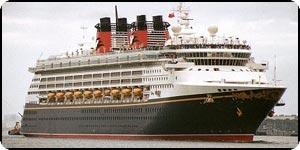Tips for Cruise Travel with Severe Food Allergies

This is a guest article written by Jenny Reed. Jenny is a franchise owner of Cruise Planners and had so many great tips for our article on Traveling With Severe Food Allergies, that I asked her to write an article about Cruising With Severe Allergies. Jenny has over 26 years of family travel experience, her staff plans safe and fun cruises and land vacations worldwide. Her agency does not charge a service fee and she welcomes your questions about travel. She can be reached toll-free at 1-866-532-7526 or Jenny AT OurCruisePlanner DOT com
Traveling with a child with severe food allergies is certainly a challenge, but it needn't consume the vacation. You and your family will be doing a lot of other things besides eating while on vacation. Being prepared is the key. Most of all, you all should have fun! So let’s talk about planning a family cruise. Cruising is one of the fastest growing family vacation options. From visiting the Caribbean to sailing a river in Europe, the possibilities are endless.
The major cruises lines allow special dietary requests including food allergies. Each has a medical form parents will fill out with the specifics at least 40 days prior to sailing. Special requests can be made for food if the cruise line is given advance notice. The cruise lines will try to accommodate the needs of their passengers and the parents can ask diligent questions as well. The general rule is not to assume anything.
Here are several of the many cruise lines that accommodate special needs requests for food allergies: Carnival Cruise Line, Celebrity Cruises, Royal Caribbean, Holland America, Princess Cruises, Disney Cruise Line.
Be sure to choose a cruise line such as these that offer traditional dining with set times so you can get to know the waiter, chef and staff.
Questions to ask before booking a cruise
- Is there a medical staff onboard and what are the clinic hours? Is the staff trained in first aid?
- What paperwork do I need submit prior to the cruise and how far in advance?
- Can I ask questions directly to the chef regarding ingredients of a prepared dish?
- What additional medical information is required by the cruise line?
- Is the children’s program staffed with counselors knowledgeable of food allergies?
What to Bring
- Check prescriptions prior to traveling. Discuss travel plans ahead of time with your allergist to be sure you have all the medicines you need, from antihistamines and inhalers to epinephrine injectors. Don't plan to rely on local pharmacies for your prescriptions — medications may not be the same overseas. Instead, take your meds with you.
- Carry hand wipes. Washing your child’s hands frequently is a great way to prevent accidentally coming into contact with allergens.
- If your child requires an epinephrine auto-injector, or other prescription medication, be sure that the pharmacy label is attached, and that the name matches the passenger's identification. Carry a letter from your doctor that explains the need for this medication. Call the airline ahead of time if flying to your destination to confirm the procedures for security.
- A cruise cabin often has a small refrigerator and plenty of storage so you may be able to bring along safe snacks as well. Be sure to confirm exactly what you will be bringing with the cruise line as they will be aware of customs regulations or other rules that might impact what you can bring.
- Take with you the names and phone numbers of all of your child’s physicians along with any other pertinent medical information including all medications and allergies.
- Purchase travel medical insurance from your travel agency at the time the deposit is made for the cruise particularly if planning to travel outside the United States.
What to expect on board
Upon boarding go see the Maitre'D at the main dining room to introduce yourself, make sure the allergies are noted in their dining system and to become familiar with where your family will be seated in the dining room.
You can specifically ask for the ingredients or how a dish is prepared from the chef on most cruise lines. Some parents carry business cards or even translation cards if traveling to a foreign country explaining their child's allergy and listing foods that could trigger a reaction. You can ask the server to deliver a card to the chef as an extra precautionary measure.
For the most part, the food on cruise ships is prepared in the large galleys so being diligent about cross contamination and asking lots of questions is the key. Many ships do offer cook to order meals with some prepared right in front of you which offers a better look at how the food is cooked and what ingredients are used.
Keep in mind that just telling one person does not insure that everyone in the chain at the dining room knows of your child’s special needs. Don't hesitate to repeat your child’s special needs or conditions as often as necessary. Parents should never feel like they can’t ask questions!
Try to take all of the meals in the main dining room so that the wait staff can be of more assistance with your child’s allergies. It is not advisable to eat in the buffet area, as the ingredients are not readily available and cross contamination is more certain.
Each night you can request the menu for the next day so that you can go over it with the Maitre D or Chef if necessary.
With a child who will be in the Children's program, attend the meeting on the first day to meet the youth counselors. Advise them of the food allergies and give them a copy of special dietary needs form as well. If you do not want them to give your child food if you are not present please discuss this with them.
Finding an Agent
An expert cruise travel agent can assist you with all steps of the planning your trip including ensuring all paperwork regarding your child’s allergies is on file with the cruise line. Using an agent does not have to cost you extra, and you should seek an agent that does not charge a service fee and puts customer service first.
Conclusion
Having severe food allergies should not limit a family’s ability to travel. You already know how to manage your child’s food allergies — you do it every day. The strategies that help you cope at home can work well on trips too. With the right preparation, the advice of a good travel agent who has experience working with food allergies, and the mindset of having a good time, fun family travel is certainly possible! Bon Voyage!
Related LinksDeliciousBaby: Why Parents Should Care About Kids With Severe Food Allergies
DeliciousBaby: Tips and Advice for Travel With Severe Food Allergies
Food Allergy Translation Cards
AllergyKids.com
FoodAllergy.org
1 comment |
Posted on June 27, 2008 |
 Save to del.icio.us
Save to del.icio.us


Comments
Jenny Reed on April 30, 2014 at 7:48 a.m.
Enjoy still getting questions from this article over the years! My 1-800 number is no longer active but I can still be reached at jenny at OurCruisePlanner (dot) com with any questions :)